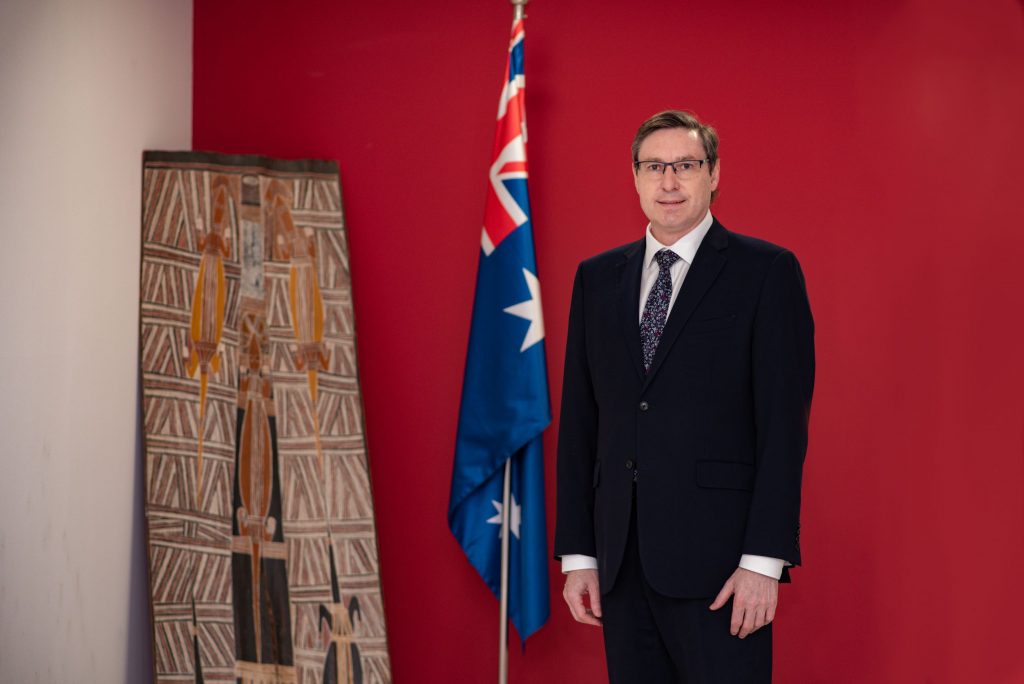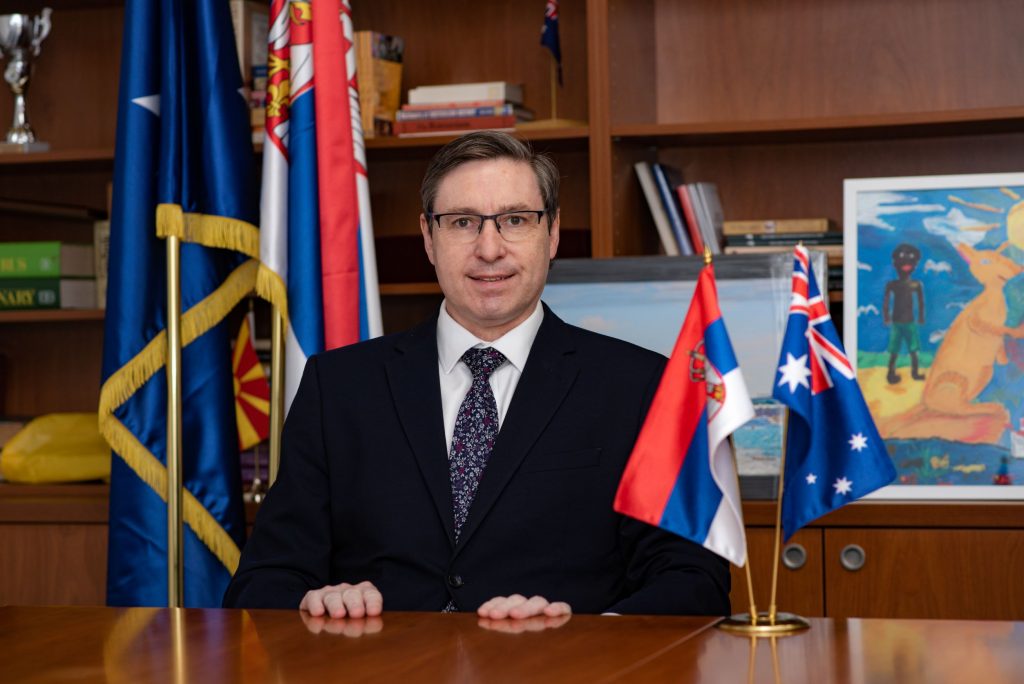We believe that the progress Serbia makes towards meeting the criteria for entry to the European Union will also help to bring our countries closer together
We spoke with the Australian Ambassador to Serbia, H. E. Daniel Emery about overall relations between the two countries, the possibilities for stronger economic ties as well as his first impressions about Serbia.

Before Serbia, you served in Zagreb, Ankara and Moscow. How well do you know the relations in Europe, as well as in the region of the Western Balkans?
While I am new to Serbia and still very much learning about the country, some of my previous jobs have given me an understanding of some of the external influences on the region, both past and present. Certainly, Turkey and Russia have at different times played important roles in shaping the history of the region, and both have continuing interests here today. My work in Zagreb gave me a good introduction to the more recent history of the region, some of the shared challenges facing countries of South-Eastern Europe, and the significance and value of membership of the European Union. My earlier work in Canberra over several years on bilateral relations with several larger EU countries with significant interests in the region has also provided valuable background.
What we need to do, both ways, to intensify contacts, in order to give an impetus to cooperation in various fields?
The Serbian Australian community provides a sound foundation for our positive relationship and contributes to strengthening ties. Although geographic distance has been a limitation, we have seen during the pandemic that so much can be done through digital communication. Most of our work in public diplomacy, and even our grants program in the last 18 months or so, has been conducted on digital platforms, and we have seen how it can be used to our advantage.
While trade volumes are currently modest, and the balance is strongly in Serbia’s favour, we believe there is considerable scope for expansion. Australia is far away, and out of mind for many Serbian businesses accustomed to looking closer to home. But many opportunities and an attractive business environment await enterprising Serbian entrepreneurs in Australia.
Culture also plays an extremely important role. It is one of the best ways to bring people closer together and allow them to learn more about different people, places and traditions. Over the years we have tried to present different aspects of Australian culture via exhibitions, films, or by bringing here renowned Australian artists. We’re very proud to have presented an exhibition in Belgrade and later in Niš last summer. Our aim was to show Serbian audiences for the first time the unique and rich cultural heritage of people from part of northern Australia, the Torres Strait Islands.
“The further development of trade and investment ties would also help to bolster bilateral relations”
Education is also an area which provides us with the opportunity for further cooperation. Australia offers a high standard of education at all levels, and I know that there are Serbian students who are looking to Australia as a favorable destination to study.
We are making steady progress on several other areas of bilateral cooperation. For example, we are close to finalising a bilateral Social Security Agreement. We are also strengthening our mutually beneficial law enforcement cooperation through our Australian Federal Police presence in Belgrade.
Recently, you have pointed out that the interest of mining companies from Australia for doing business in Serbia is growing. What kind of investment does this entail?
The Australian mining footprint is growing as part of a general upturn in mining-related investment by foreign companies. Serbia has a long history of mining and is a prospective investment destination. We believe that mining investment that is environmentally and socially responsible has the potential to make a significant contribution to Serbia’s development, including at the regional level. The products of key projects will also help with the transition to a greener economy in Serbia and across Europe. Apart from the Jadar project of Anglo-Australian company Rio Tinto, Australian investment in the mining sector comes from junior mining companies that focus on early-stage exploration projects, and Australian mining equipment, technology and services providers.
In your opinion, what can be the sectors and where are the possibilities for stronger economic ties?
The main basis for stronger economic links in the short to medium term is likely to be the resources sector. This is an industry in which Australian companies have a lot of experience and expertise. This potentially means more Australian companies on the ground, opening the door to additional investment and expertise in mining technology and infrastructure; environmentally sustainable mining practices; corporate social responsibility; and mine safety. Importantly, this would result in significant knowledge and skills transfer and would generate highly skilled, highly paid jobs in communities across Serbia.

Another area where there is ample potential is the services sector. Several Australian companies, some of them globally-renowned corporations, have successfully been doing business in Serbia for a number of years. Highly skilled Serbian workers are employed across Serbia to provide a wide variety of services to both local and international clients. Represented industry sectors include: online software for aged care, infrastructure, environmental & social development advisory, retail and wholesale logistics/pooling solutions, civil and traffic engineering, web design, implantable hearing devices, financial advisory, climate control systems, managed IT support and ticketless parking technology, to name just a few.
What are the major challenges for Australia today, when we are speaking about fighting against the Covid-19 crisis?
A key challenge for Australia, like most countries, is increasing the rate of vaccination to the point where transmission of the virus can be kept to a minimum and the most vulnerable people are well protected. Unlike Serbia, Australia was slow to start its vaccination program and initially faced some supply constraints. But after a concerted effort from the middle of this year, some parts of the country have now achieved high vaccination rates, which has allowed us to progressively remove restrictions on international travel, lift quarantine requirements for vaccinated travelers, and return to a more normal way of living. We are currently working with Serbia on mutual recognition of our vaccination certificates.
Australia’s strict border control measures were successful in containing COVID-19 but came at an economic as well as social cost. Like most countries, Australia had to increase government spending to limit the impact of the pandemic on vulnerable sectors of the economy, and individuals directly affected. We hope there will be a sustained recovery as a border and other restrictions are relaxed.
The numerous Serbian community in Australia has an important role in connecting the two countries. What kind of policy does your government have regarding immigrants?
Serbs and people of Serbian descent in Australia have found success in many fields and made a valuable contribution of our society. Australia has programs for both permanent migration and temporary work visas. Both programs are open to people from all over the world on a non-discriminatory basis. They focus on the contribution a person can make to Australia rather than their nationality, ethnicity, or religious affiliation.
“We have given a high priority to cooperation with neighbours and partners in the Pacific and South-East Asia to combat the virus”
Australia’s Temporary Skilled Visa Program is underpinned by skilled migration occupation lists, which are regularly reviewed to ensure that migration is targeted at Australia’s changing economic needs. The demand driven nature of Australia’s temporary visa system provides us with the flexibility to be highly responsive to the economic, social and political needs of the country, as well as broader global trends. Australia also has a separate Refugee and Humanitarian Program, which includes resettlement of refugees through UNHCR.
Young people from Serbia still consider Australia a possible destination to relocate to. Does Australia still encourage their arrival?
We would encourage Serbs who meet the skills criteria, along with people from other countries, to consider Australia as a place to work. Although they would be far from home, they would find there a well-established and integrated Serbian community, and good quality of life. Using their knowledge of Serbia, they could also play a role in building commercial links between the two countries.
We would also welcome interest from young Serbs in coming to Australia to study. Australia remains an attractive and welcoming destination for international students. Our education system has recently been disrupted by COVID-related measures, but Australia now looks forward to welcoming international students back to our classrooms, campuses and communities in the near future.
In previous years Australia has assisted in the work of organisations dealing with human rights and gender equality in Serbia. What will be the main projects on your agenda?
The Embassy has been providing support to local community organisations and NGOs in Serbia for many years through a grants program (Direct Aid Program – DAP). Promoting human rights and freedom of expression has been a constant DAP priority along with gender equality and empowering women and girls. Our special focus this year will be on fostering inclusiveness for people with disabilities, and small-scale projects that support environmental sustainability.
To respond to the challenges many vulnerable groups have been facing, we have been providing support to projects that mitigate the social, health and economic consequences of the COVID-19 pandemic. Supporting programs that aim to end violence against women is another important part of the Embassy’s work. We work together with the government and civil society to raise awareness of domestic violence. The Embassy is proud of the many partnerships we have developed through our DAP program and the inspiring projects we have been able to support. We are happy to see that many of these projects continue after our financial support ends.
First impression
What is your first impression of Belgrade and Serbia?
Belgrade seems like a very energetic and lively city. It has a reputation for a rich and diverse cultural life, but in the short time, I have been here I haven’t had the chance to see much of it because of COVID-related restrictions. I’m looking forward to enjoying some of that when the situation improves. I find the architecture of the city, which includes buildings from many different eras and traditions, really fascinating. People here have been friendly and welcoming, which I have greatly appreciated.